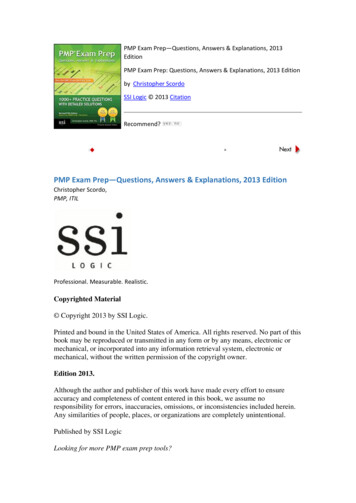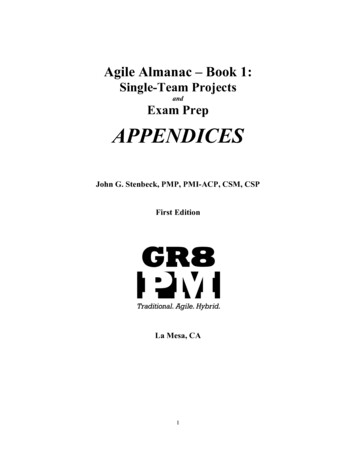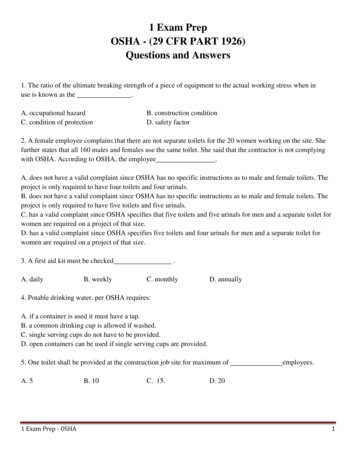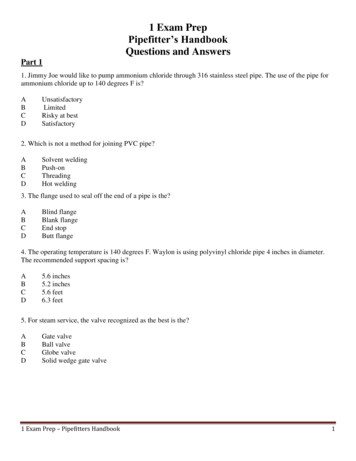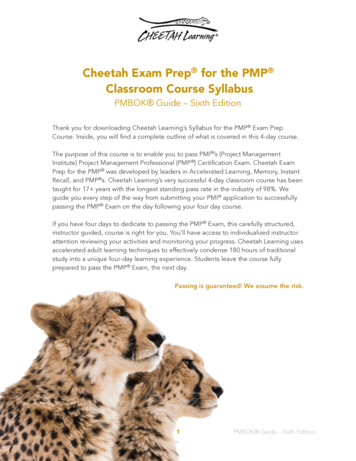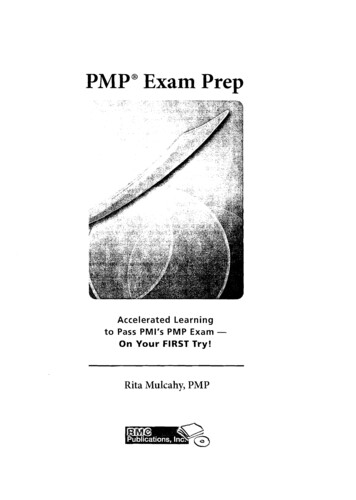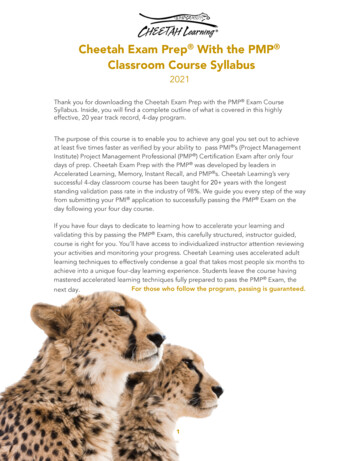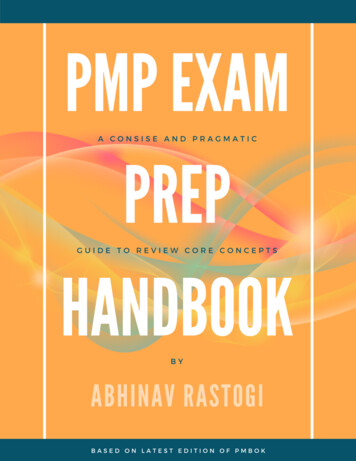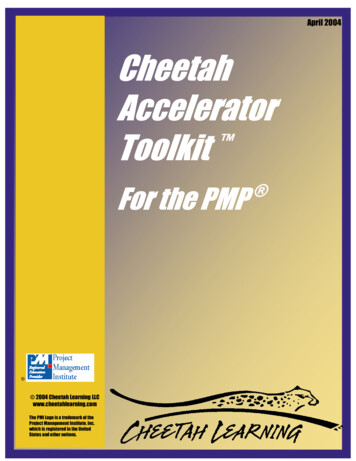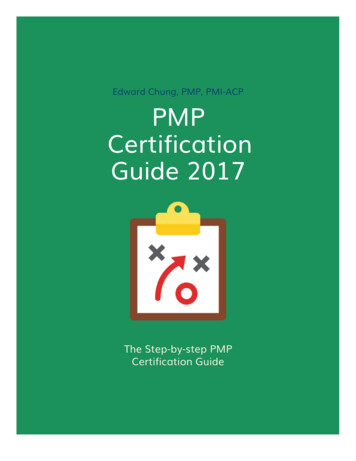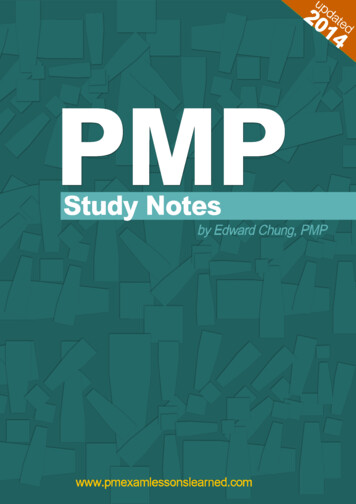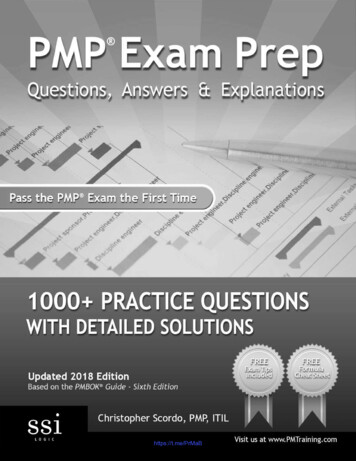
Transcription
https://t.me/PrMaB
https://t.me/PrMaB
https://t.me/PrMaB
Copyrighted Material Copyright 2018 by SSI Logic. Printed and bound in the United States of America. All rightsreserved. No part of this book may be reproduced or transmitted in any form or by any means,electronic or mechanical, or incorporated into any information retrieval system, electronic ormechanical, without the written permission of the copyright owner.Edition 2018.Although the author and publisher of this work have made every effort to ensure accuracy andcompleteness of content entered in this book, we assume no responsibility for errors, inaccuracies,omissions, or inconsistencies included herein. Any similarities of people, places, or organizations arecompletely unintentional.Published by SSI LogicLooking for more PMP exam prep, courseware and classes?Visit us at www.PMTraining.comISBN 10: 982576803ISBN 13: 9780982576809All inquiries should be addressed via email to:support@pmtraining.comor by mail post to:PMTraining340 S Lemon Ave #9038Walnut, CA 91789"PMI", "PMP", "PgMP", "CAPM", and "PMBOK Guide" are registered marks of Project ManagementInstitute, Inc.https://t.me/PrMaB
Table of ContentsIntroductionWelcomePMP Exam OverviewPractice Exams and QuizzesPMP Lite Mock Exam 1Knowledge Area Quiz: Project Management FrameworkPMP Lite Mock Exam 2Knowledge Area Quiz: Project Integration ManagementPMP Lite Mock Exam 3Knowledge Area Quiz: Project Scope ManagementPMP Lite Mock Exam 4Knowledge Area Quiz: Project Schedule ManagementPMP Lite Mock Exam 5PMP Lite Mock Exam 6Knowledge Area Quiz: Project Cost ManagementPMP Lite Mock Exam 7PMP Lite Mock Exam 8Knowledge Area Quiz: Project Quality ManagementPMP Lite Mock Exam 9https://t.me/PrMaB
PMP Lite Mock Exam 10Knowledge Area Quiz: Project Resource ManagementPMP Lite Mock Exam 11PMP Lite Mock Exam 12Knowledge Area Quiz: Project Communications ManagementPMP Lite Mock Exam 13PMP Lite Mock Exam 14Knowledge Area Quiz: Project Risk ManagementPMP Lite Mock Exam 15PMP Lite Mock Exam 16Knowledge Area Quiz: Project Procurement ManagementPMP Lite Mock Exam 17Knowledge Area Quiz: Project Stakeholder ManagementPMP Lite Mock Exam 18PMP Focus Area Test: Professional and Social ResponsibilityPMP Formula Cheat SheetPMP FormulasAdditional ResourcesExam Taking Tipshttps://t.me/PrMaB
INTRODUCTIONhttps://t.me/PrMaB
WelcomeThank you for selecting SSI Logic’s PMP Exam Prep – Questions,Answers, and Explanations for your Project Management Professional(PMP) study needs. The goal of this book is to provide condensed mockexams and practice tests which allow you to become comfortable with thepace, subject matter, and difficulty of the PMP exam.The content in this book is designed to optimize the time you spend studyingin multiple ways.1. Practice exams in this book are condensed to be completed in one hour;allowing you to balance your time between practice tests and offline study.2. Passing score requirements in this book are slightly higher than the realexam; allowing you to naturally adjust to a higher test score requirement.3. Practice exams included in this book cover the entire scope of the PMPexam, while shorter quizzes focus only on specific Knowledge Areasoutlined in A Guide to the Project Management Body of Knowledge(PMBOK Guide) — Sixth Edition.The practice exam content in this book is structured into two general types ofexam preparation: “Lite” Mock Exams, which allow you to test your knowledge acrosscondensed versions of the PMP exam; designed to be completed within onehour. Knowledge Area Quizzes, which reflect brief practice tests focused onspecific Knowledge Areas outlined in the PMBOK Guide, designed to becompleted in 15 minutes.https://t.me/PrMaB
PMP Exam Updates as of March 2018This book reflects the updated version of the PMP exam put into placeworldwide starting March 26, 2018. While many refinements have beenapplied to the material to be tested on, a particular focus has been placed onan agile approach integrated with traditional project management.Please note: The PMBOK Guide – Sixth Edition is the definitivereference text for the PMP certification exam.To accommodate the updated exam content, this book has been revisedextensively so that exam and PMBOK Guide revisions are taken intoaccount.PMP Exam OverviewThe content in this book reflect the PMP exam version updated March 26,2018; and are based on the content contained within the PMBOK Guide –Sixth Edition.About the Project Management Professional (PMP) CertificationThe PMP certification is managed by the Project Management Institute(PMI ) and reflects the PMI's project management processes as published inthe PMBOK Guide. Since 1984, the PMP certification has been one of themost sought-after project management credentials available.The average salary of a PMP certified manager is 16% higher thanindividuals without the PMP certification.The PMP certification is a globally recognized credential, and individuals areencouraged to remain active via PMI's Continuing CertificationRequirements (CCRs). Only individuals who maintain active PMPcredentials may refer to themselves as Project Management Professionals.Individuals do not need to be a member of PMI to earn a PMP credential.The minimum requirements in attaining the PMP certification:https://t.me/PrMaB
Education: At a minimum, A high school diploma is required Project management experienceo 36 months and 4500 hours of professional experience for individuals with abachelor’s degree or global equivalent (within the past 8 years)o 60 months and 7500 hours of professional experience for individualswithout a bachelor’s degree or equivalent (within the past 8 years) Project Management Education: 35 contact hours of formal education Ethics: Agree to PMI's Code of Ethics and Professional Conduct Pass the PMP ExamPMP Exam DetailsThe PMP exam is designed to objectively assess and measure projectmanagement knowledge. Concepts covered in the PMP exam are directlyderived from the PMBOK Guide, an internationally recognized standard(IEEE Std 1490-2003) which outlines project management fundamentals; andis applicable to a wide range of industries.The actual exam is offered in both a computer-based testing (CBT)environment, as well as through proctored paper-based exams. A summary ofthe exam structure and passing requirements are as follows: There are 200 total multiple-choice questions which make up the PMPexam 25 randomly placed "pretest questions" are included, and do not counttowards the pass/fail determination Individuals have four hours to complete the exam Only correct answers count, and a passing score is determined by “soundpsychometric analysis”. This method indicates that scores reflect thedifficulty of the questions answered. ** For the purposes of this book, a numeric scoring system will be applied,allowing students to easily measure their knowledge.https://t.me/PrMaB
The Ten Knowledge Areas of the PMBOK GuideThe ten knowledge areas outlined in the PMBOK Guide and covered by thePMP exam are listed below. Project Integration Management Project Scope Management Project Schedule Management Project Cost Management Project Quality Management Project Resource Management Project Communications Management Project Risk Management Project Procurement Management Project Stakeholder ManagementAdditionally, the PMP practice exam content in this book include questionson the overall Project Management Framework and ProfessionalResponsibility; reflecting the real PMP exam.The ten knowledge areas contain a total of 49 processes which are applied tofive basic process groups. These five basic process groups, or “domains”,are common across all projects and listed below along with the percentage ofquestions one should expect on the PMP exam:1. Initiating (13%)2. Planning (24%)3. Executing (31%)4. Monitoring and Controlling (25%)5. Closing (7%)https://t.me/PrMaB
PRACTICE EXAMS AND QUIZZEShttps://t.me/PrMaB
PMP Lite Mock Exam 1Practice QuestionsTest Name: PMP Lite Mock Exam 1Total Questions: 50Correct Answers Needed to Pass: 35 (70.00%)Time Allowed: 60 MinutesTest DescriptionThis is a cumulative PMP Mock Exam which can be used as a benchmark foryour PMP aptitude. This practice test includes questions from all PMBOK Guide knowledge areas, including the five basic project management processgroups.Test Questions1. During the development of the project stakeholder engagement plan, aproject manager is usually dependent on the voice of the projectstakeholders to obtain expert opinion. Which of the following is animportant tool available to the project manager for gathering andorganizing stakeholders’ information?A. Fishbone diagramsB. Control chartsC. HistogramsD. Focus groupshttps://t.me/PrMaB
2. During which of the following project processes do key stakeholdersengage with the project for the first time?A. Develop Project CharterB. Identify StakeholdersC. Collect RequirementsD. Plan Stakeholder Engagement3. Which of the following components of a project scope statement is usefulin reducing scope creep?A. Acceptance criteriaB. DeliverablesC. Scope descriptionD. Exclusions4. As you create the Activity List, which technique is recommended forsubdividing the project into smaller components called activities?A. DecompositionB. Rolling Wave PlanningC. Expert JudgmentD. Deconstruction5. During the development of the project stakeholder engagement plan, theproject manager is usually dependent on the expert judgment of seniorhttps://t.me/PrMaB
stakeholders to identify and plan effective stakeholder managementstrategies. Which of the following stakeholders cannot guide the projectmanager in developing effective strategies for internal stakeholders?A. SponsorB. Identified key stakeholdersC. CustomersD. Project team members6. The Create WBS process identifies the deliverables at thelevel in the Work Breakdown Structure (WBS).A. LowestB. AnyC. TenthD. Highest7. What is the primary risk when including reserves, or contingencyallowances, in your cost estimate?A. Cancelling your projectB. Understating the cost estimateC. Overstating the cost estimateD. Tracking the funds8. Which of the following statements most accurately describes a projecthttps://t.me/PrMaB
scenario?A. Changes in project scope during the initial phases of the project are veryexpensive.B. The influence of the stakeholders is the same all through the project.C. Staffing peaks during the execution phase of a project.D. The next phase of a project should never start until the deliverables for theprevious phase are completely reviewed and approved.9. Which of the following is not an organizational process asset used duringthe Plan Resource Management process?A. Template for resource management planB. Resource management policies and proceduresC. Historical information about previous projectsD. Standardized stakeholder list10. During the Manage Stakeholder Engagement process, a number ofproject documents might get updated. Which of the following projectdocuments get updated the most during this process?A. Stakeholder registerB. Risk registerC. Project reportsD. Project presentationshttps://t.me/PrMaB
11. Few project managers collect lessons-learned information throughout theproject’s life. Most tackle this in the final days of the project or, worse,after the project is complete. What is the negative consequence of thisapproach?A. It makes compiling and obtaining project information difficult.B. It might result in further expenses on the project.C. The project’s NPV becomes zero.D. It requires hiring a specialist to do the job.12. After brainstorming potential project risks, what is the recommendedmethod for prioritizing these risks and their mitigation plans?A. RACI chartB. Control chartC. Fishbone diagramD. Probability and impact matrix13. If you are managing changes to the project's cost baseline, which processare you using?A. Negotiate CostsB. Estimate CostsC. Control CostsD. Determine Budgethttps://t.me/PrMaB
14. During the Control Procurements process, a number of documents mightget updated due to various reasons. Which of the following componentsof the project management plan is least likely to get updated during thisprocess?A. Quality management planB. Procurement management planC. Schedule baselineD. Cost baseline15. In order to facilitate project configuration and change management oncomplex projects, a project manager relies on configuration and changemanagement tools. Such tools:A. Can be manual or automatic; the selection depends on the project’senvironment and requirements.B. Must be manual; a complex project requires all change requests to bemanually signed.C. Must be automatic; a complex project requires complex change controlprocedures.D. Change control must be manual, but the configuration control may beautomatic.16. Various tools and techniques determine project requirements during theCollect Requirements process. These requirements form the basis fordefining the project scope. One of the responsibilities of a projectmanager is to identify key project deliverables during this exercise.Where are the key project deliverables documented?https://t.me/PrMaB
A. Scope Management PlanB. Requirements Management PlanC. Project Scope StatementD. Accepted Deliverables17. The most detailed level of the WBS is the .A. Control AccountB. Work packageC. Scope statementD. Accepted Deliverable18. Which of the following is a hierarchical representation of project risks?A. Risk RegisterB. Risk MitigationC. Risk CategoriesD. Risk Breakdown Structure19. If an investment in a project returns 15 percent annually, how muchshould you invest to get 5 million by the end of the fifth year?A. 2485884B. 2857143https://t.me/PrMaB
C. 2501376D. 268529220. A business is considering more than a dozen infrastructure upgradeprojects. These projects, once delivered, will add to the organization’so
Thank you for selecting SSI Logic’s PMP Exam Prep – Questions, Answers, and Explanations for your Project Management Professional (PMP) study needs. The goal of this book is to provide condensed mock exams and practice tests which allow you to become comfortable with the pace, subject matter, and difficulty of the PMP exam. The content in this book is designed to optimize the time you .
